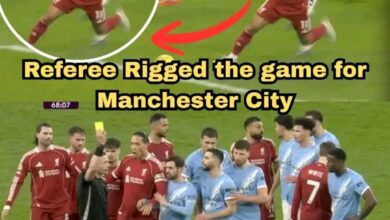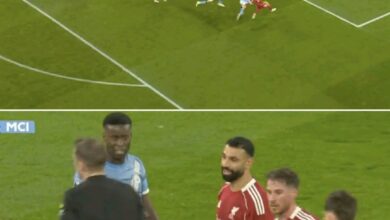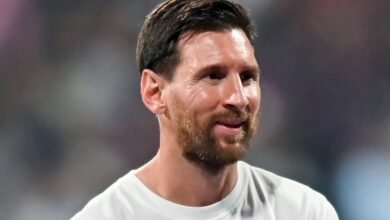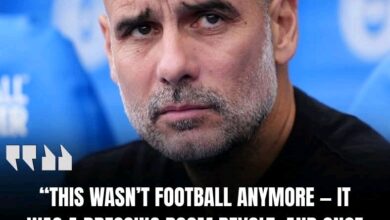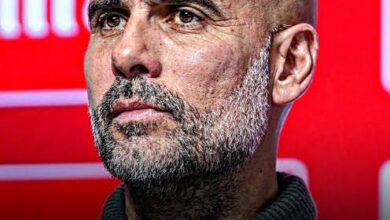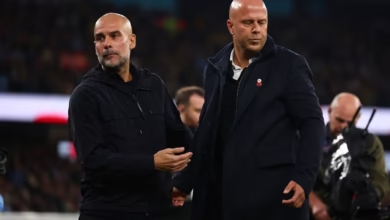Man City star ‘left out Club World Cup squad’ as Man Utd eye controversial deal
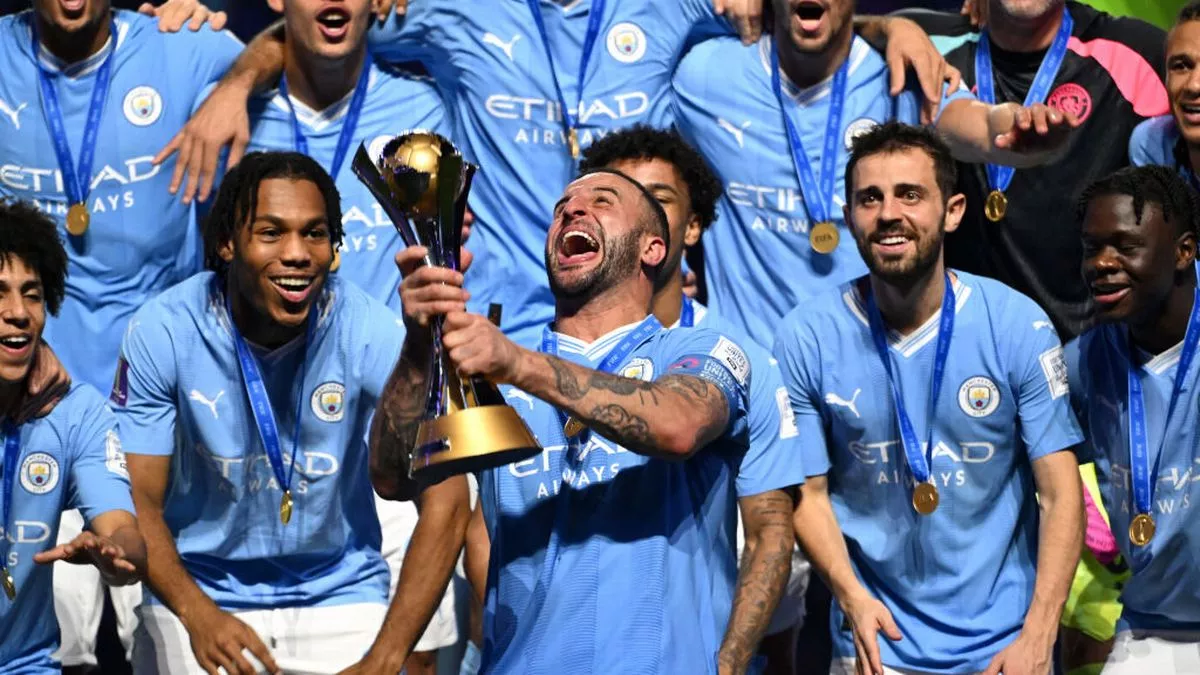
In the unforgiving world of elite football, sometimes the most telling decisions are the ones that aren’t made. Manchester City’s exclusion of James McAtee from their Club World Cup squad represents one such moment – a calculated omission that has sent ripples through the Manchester football landscape and could potentially reshape the career trajectory of one of England’s most promising young talents.
The 22-year-old academy graduate, who has spent the better part of his footballing education within the blue walls of the Etihad Campus, finds himself at a crossroads that could define not just his immediate future, but the next decade of his professional career. His absence from Pep Guardiola’s travelling party for this summer’s prestigious FIFA tournament in the United States has been interpreted by many as a clear signal – both to the player and the wider football community – about where he stands in the Catalan coach’s long-term plans.
The Academy Dream and the Harsh Reality
James McAtee’s journey through Manchester City’s academy system reads like a modern football fairy tale, albeit one that has yet to reach its desired conclusion. Joining the club at the tender age of seven, McAtee has witnessed firsthand the transformation of City from Premier League newcomers to global powerhouses. He has grown up alongside the club’s meteoric rise, absorbing the tactical philosophies of various coaches while developing his craft in one of Europe’s most sophisticated youth development programs.
His technical ability has never been in question. Standing at just over 5’8″ with a slight frame that belies his tenacity, McAtee possesses the kind of close control and vision that marks him out as a distinctly modern attacking midfielder. His left foot carries the precision of a surgeon’s scalpel, capable of threading passes through the smallest of gaps or curling shots into the top corner with devastating effect.
The highlight of his senior City career came during an FA Cup tie earlier this season when he announced himself on the grand stage with a memorable hat-trick. The performance showcased everything that makes McAtee special – his ability to find space in congested areas, his composure in front of goal, and his football intelligence that allows him to make the right decision at crucial moments. For 90 minutes, he looked every inch the player that City’s academy coaches had predicted he would become when they first spotted his potential over a decade ago.
Yet in the harsh arithmetic of elite football, moments of brilliance must be weighed against consistency, potential against proven performance, and promise against immediate impact. McAtee’s senior appearances for City have been sporadic, often coming in domestic cup competitions or during the dying moments of already-decided Premier League matches. While he has contributed goals and assists when called upon, he remains very much on the periphery of Guardiola’s first-team considerations.
Guardiola’s Dilemma: The Burden of Endless Talent
Pep Guardiola’s relationship with young players has always been complex, shaped by his perfectionist nature and unwavering commitment to tactical discipline. The Spanish coach has never been one to hand out opportunities based on sentiment or potential alone – every player, regardless of age or background, must earn their place through demonstration of tactical understanding, physical readiness, and mental maturity.
In McAtee’s case, Guardiola faces a familiar conundrum that has defined much of his tenure at Manchester City. The club’s academy continues to produce technically gifted players who show immense promise at youth level, yet the gap between academy football and the intensity of competing for Premier League and Champions League titles remains vast. The margin for error at City is virtually non-existent, where a single misplaced pass or momentary lapse in concentration can be the difference between victory and defeat in crucial matches.
Guardiola’s honest assessment of McAtee’s situation, delivered with characteristic directness during a press conference in April, reveals the internal conflict that defines these decisions. “For the age, I’d like him to stay,” he admitted, acknowledging both the player’s talent and his own desire to see academy products succeed. “But I understand players want more minutes. He can play different positions but I don’t know how the squad will be and we will see.”
This statement encapsulates the central tension in modern football development. Clubs invest millions in academy infrastructure and coaching, developing players from childhood with the ultimate goal of integrating them into the first team. Yet the commercial pressures and expectations surrounding top-tier clubs create an environment where patience becomes a luxury few can afford.
The exclusion from the Club World Cup squad serves as a practical manifestation of this dilemma. The tournament, taking place across several major American cities during the summer months, represents City’s opportunity to claim the one major trophy that has eluded them during Guardiola’s reign. With such high stakes, the Catalan coach has opted for experience and proven reliability over the potential upside of giving McAtee crucial tournament experience.
The Manchester United Temptation
Perhaps no aspect of McAtee’s current situation carries more dramatic potential than the reported interest from Manchester United. In the tribal landscape of Manchester football, where loyalty lines are drawn in red and blue, the prospect of a City academy graduate moving directly to Old Trafford represents the kind of transfer that transcends mere business considerations and enters the realm of footballing betrayal.
The geographical proximity of the two clubs – separated by mere miles but worlds apart in philosophy and identity – adds layers of complexity to any potential deal. For Manchester United, acquiring a player of McAtee’s caliber from their cross-city rivals would represent both a sporting coup and a symbolic victory. The Red Devils have struggled in recent years to identify and develop young English talent, making McAtee’s availability particularly attractive.
From a tactical perspective, McAtee’s skill set aligns well with the kind of player United have been seeking to add to their squad. His ability to operate in multiple positions across the attacking midfield line provides the versatility that modern football demands, while his technical proficiency and creative instincts could add a new dimension to United’s offensive play.
The financial aspects of such a transfer would be equally significant. With McAtee’s contract set to expire in 2026, City face the uncomfortable reality of potentially losing him for nothing if they cannot convince him to sign a new deal. United, aware of this timeline, could position themselves to acquire a player they might otherwise never have access to, taking advantage of the contractual uncertainty to their benefit.
For McAtee himself, the prospect of joining United presents both opportunity and risk. On one hand, he would likely receive more immediate playing time and the chance to establish himself as a key player for a club rebuilding its identity. On the other hand, the intense scrutiny that would accompany such a controversial move could add pressure that might hinder his development.
The Bundesliga Alternative
While the Manchester United speculation generates headlines and stokes local rivalries, McAtee’s own preferences reportedly point toward a different path entirely. The Bundesliga, Germany’s top flight, has emerged as his preferred destination – a choice that reflects both pragmatism and ambition in equal measure.
The German league has established itself as the premier destination for young English players seeking to accelerate their development away from the intense scrutiny of the Premier League. The success stories of Jadon Sancho and Jude Bellingham have created a blueprint that other young English talents are increasingly eager to follow.
Sancho’s journey from Manchester City’s academy to Borussia Dortmund and eventually back to England as an established international represents exactly the kind of career trajectory that McAtee might envision for himself. Bellingham’s even more dramatic rise from Birmingham City teenager to Real Madrid star via Dortmund demonstrates the potential rewards for players willing to embrace the German development model.
Bayer Leverkusen have emerged as potential suitors for McAtee, and the timing could hardly be better. The club, fresh off their historic Bundesliga triumph and unbeaten season, represents an attractive proposition for any young player. Under Xabi Alonso’s guidance, Leverkusen have demonstrated their ability to develop young talent while competing at the highest level.
The German approach to youth development emphasizes tactical education and gradual integration, allowing players to make mistakes and learn from them without facing the immediate consequences that characterize English football. For McAtee, this environment could provide the perfect platform to refine his game and gain the experience necessary to eventually return to the Premier League as a more complete player.
The Academy Exodus Problem
McAtee’s situation highlights a broader issue that has plagued Manchester City throughout Guardiola’s tenure – the consistent exodus of academy graduates who go on to achieve success elsewhere. The list of former City youth players who have carved out impressive careers after leaving the club reads like a who’s who of English football talent.
Morgan Rogers, mentioned in the original reporting, represents perhaps the most glaring example of this phenomenon. The attacking midfielder left City to join Middlesbrough before eventually finding his way to Aston Villa, where he has established himself as a key player in the Premier League. His success has raised questions about whether City gave him sufficient opportunity to prove himself at the highest level.
Similar stories can be told about numerous other academy graduates who have found success after leaving the Etihad. Each departure represents not just a loss of individual talent, but also a failure to maximize the return on the substantial investment City has made in their youth development program.
Critics argue that Guardiola’s perfectionist approach, while successful in terms of first-team results, creates an environment where young players struggle to break through. The coach’s tactical demands and the technical precision required to excel in his system can be overwhelming for players still finding their feet at senior level.
Defenders of the current approach point to the success stories of players like Phil Foden, who persevered through limited early opportunities to become one of England’s most important players. They argue that the high standards set by Guardiola ultimately benefit those players strong enough to meet them, creating better footballers in the long run.
The Financial Calculations
Behind the emotional narratives and sporting considerations lies a complex web of financial calculations that will ultimately influence McAtee’s future. Manchester City, despite their considerable wealth, operate within the constraints of Financial Fair Play regulations that require careful management of their squad investment.
McAtee’s current contract situation places City in a familiar but uncomfortable position. With just two years remaining on his deal, the club must decide whether to offer him improved terms that reflect his development, risk losing him for nothing in 2026, or cash in now while they can still command a substantial transfer fee.
The player’s market value has been estimated at various figures, but most observers believe he would command a fee in the region of £15-25 million in the current market. For a player with limited first-team experience, this represents significant value – money that City could reinvest in other areas of their squad.
From McAtee’s perspective, the financial considerations are equally complex. A move to the Bundesliga might offer lower immediate wages but could provide the platform for long-term career growth that ultimately proves more lucrative. A transfer to Manchester United would likely come with higher immediate financial rewards but carries the risk of becoming embroiled in a struggling project.
The involvement of agents and intermediaries adds another layer of complexity to these negotiations. Modern football transfers involve multiple parties, each with their own interests and incentives, making it difficult to predict outcomes based purely on sporting considerations.
The England Factor
McAtee’s inclusion in England’s U21 squad for their upcoming European Championship campaign adds another dimension to his current situation. The tournament in Slovakia represents a crucial opportunity for him to showcase his abilities on an international stage and demonstrate his readiness for senior football.
England’s youth development pathway has become increasingly competitive in recent years, with the success of the senior team raising expectations at every level. For players like McAtee, international recognition serves as both validation of their progress and additional pressure to maintain their development trajectory.
The timing of the U21 Euros, running concurrently with City’s Club World Cup campaign, creates an interesting parallel narrative. While his City teammates will be competing for club glory in America, McAtee will be representing his country in Europe – a scenario that highlights the complex loyalties and priorities that define modern football careers.
Success with England’s U21s could significantly enhance McAtee’s profile and transfer value, potentially opening doors to clubs and opportunities that might not otherwise be available. Conversely, a disappointing tournament could raise questions about his readiness for the next level of his career.
The Guardiola Legacy Question
As Pep Guardiola approaches what many believe to be the final years of his Manchester City tenure, questions about his legacy extend beyond trophies and playing style to include his handling of the club’s academy graduates. The McAtee situation represents a microcosm of broader debates about the Catalan coach’s relationship with youth development.
Guardiola’s defenders point to his track record of developing young players throughout his career, from Barcelona’s golden generation to the current success of Phil Foden at City. They argue that his demanding standards, while difficult for young players to meet, ultimately create better footballers for those who can adapt.
Critics suggest that Guardiola’s perfectionist approach and tactical complexity make it unnecessarily difficult for academy players to break through, leading to talent being wasted or lost to other clubs. They point to the success of former City youth players elsewhere as evidence that the club’s development pathway may be flawed.
The resolution of McAtee’s situation could provide important data points for this debate. If he moves elsewhere and achieves significant success, it will add weight to criticisms of City’s youth integration process. If he stays and eventually establishes himself in Guardiola’s team, it could vindicate the current approach.
The Broader Context of Modern Football Development
McAtee’s dilemma reflects broader trends in contemporary football that extend far beyond Manchester City’s specific circumstances. The increasing commercialization of the sport has created an environment where patience with young players has become a rare commodity, even at clubs with substantial resources.
The pressure to achieve immediate results, driven by owner expectations and fan demands, creates a culture where proven experience is often valued more highly than potential. This dynamic particularly affects players in McAtee’s position – talented enough to deserve opportunities but not yet established enough to be considered indispensable.
The globalization of football has also created new pathways for player development that didn’t exist in previous generations. The Bundesliga route that appeals to McAtee represents just one of many options available to ambitious young players willing to leave their comfort zones in pursuit of regular playing time and career advancement.
These trends raise important questions about the future of youth development in elite football. If clubs continue to prioritize short-term success over long-term player development, will the next generation of footballers increasingly look abroad for opportunities to fulfill their potential?
The Decision Point
As the summer transfer window approaches, James McAtee finds himself at the center of a complex web of sporting, financial, and personal considerations that will shape the next phase of his career. His exclusion from Manchester City’s Club World Cup squad has crystallized the choice he faces: remain at the club where he has spent most of his footballing life and fight for opportunities that may never come, or embrace the uncertainty of a new challenge that could accelerate his development.
The various parties involved in this situation each bring their own motivations and constraints. Manchester City must balance their desire to retain a promising academy graduate against the practical realities of squad management and financial efficiency. Manchester United see an opportunity to acquire a talented player from their rivals while addressing their own developmental needs. German clubs offer an alternative pathway that has proven successful for other young English players.
For McAtee himself, the decision represents more than just a career choice – it’s a statement about his ambitions, his risk tolerance, and his vision for his footballing future. At 22, he still has time to recover from potential missteps, but the window for establishing himself as a top-level player is beginning to narrow.
Conclusion: A Tale of Modern Football
The James McAtee situation encapsulates many of the defining characteristics of contemporary football: the tension between tradition and pragmatism, the complexity of modern player development, and the increasingly global nature of career opportunities. Whatever decision he ultimately makes will reverberate beyond his own career, potentially influencing how other young players and clubs approach similar situations in the future.
As Manchester City prepare for their Club World Cup campaign without him, and as various suitors circle with tempting offers, McAtee’s story serves as a reminder that football success is rarely linear. Sometimes the most important decisions are the ones that take players away from familiar surroundings and into uncharted territory.
The coming weeks will likely provide clarity on McAtee’s immediate future, but the broader questions his situation raises – about youth development, club loyalty, and career progression in modern football – will continue to resonate throughout the sport. In many ways, his journey from here will serve as a case study for the next generation of talented youngsters navigating similar crossroads in their own careers.
Whether he ultimately stays at Manchester City, moves to Manchester United, heads to Germany, or finds another path entirely, James McAtee’s decision will be watched closely by observers throughout football. His story is far from over – in many ways, it’s just beginning.







